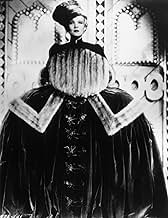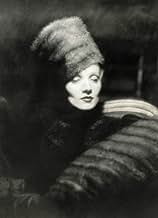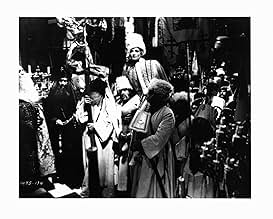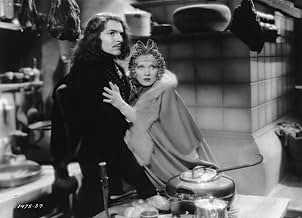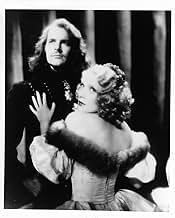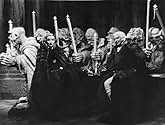Una mujer de la nobleza alemana contrae matrimonio sin amor con el heredero torpe e inestable al trono ruso, y luego planea expulsarlo del poder.Una mujer de la nobleza alemana contrae matrimonio sin amor con el heredero torpe e inestable al trono ruso, y luego planea expulsarlo del poder.Una mujer de la nobleza alemana contrae matrimonio sin amor con el heredero torpe e inestable al trono ruso, y luego planea expulsarlo del poder.
- Dirección
- Guionistas
- Elenco
- Premios
- 1 premio ganado en total
- Count Lestoq
- (as Phillip Sleeman)
- Ivan Shuvolov
- (as Hans von Twardowski)
- Sophia as a Child
- (as Maria)
- Lackey #5
- (sin créditos)
- Count von Breummer
- (sin créditos)
- Sophia's Aunt
- (sin créditos)
- Dirección
- Guionistas
- Todo el elenco y el equipo
- Producción, taquilla y más en IMDbPro
Opiniones destacadas
A riotous feast for the eyes, this is one of the great, unheralded films of the 1930's - enthralling for its visual impact alone. Seldom has an American film been filled with such lush imagery - tactile, grotesque, fascinating. The Russian royal palace is a charnel house full of ghouls & gargoyles - human & artistic. The actors share the scenes with fantastic statuary, twisting & writhing in silent, unspeakable pain. (Notice the tiny skeletons on the dining table.) Everywhere is death, moral decay & barbarism, even in the most powerful court in Europe.
At the center of this ossuary is the gorgeous Marlene Dietrich. Her beauty radiates, but never dominates, throughout the film. She is splendid as a young woman in a very dangerous place, who gains courage & great determination in her ordeal. Equally good is Sam Jaffe as Peter; with his leering grin & demented eyes he is the very picture of a murderous madman.
Louise Dresser, as the Empress Elizabeth, is very effective as a comic bully. John Lodge & Gavin Gordon, as Catherine's military lovers, are both stalwart. Wonderful old Sir C. Aubrey Smith has a small role as Catherine's princely father. Film mavens will spot an uncredited Jane Darwell as Catherine's nurse.
The highly emotional soundtrack, an amalgam of themes by Tchaikovsky, Mendelssohn & Wagner, explodes in the film's final moments into musical pyrotechnics.
This was a movie about excess as much as anything, curtains that go on forever, huge doors, loud music, etc. They just don't make them like this anymore and certainly couldn't afford to then, either.
I don't think I ever saw Marlene anymore sensual than in this film, and I agree, her idea of playing a 'poor innocent gal'-that isn't put across well at all. Sometimes you just can't fake it, no matter how hard you try.
*** outta ****, style over everything.
The whole of the Russian court turns out to be not much different from the vile stories of atrocity she was narrated to as a child, one after another a series of machinations at the hands of the half-mad.
But of course history was never the purpose for Sternberg, these stories at the beginning of the film he visualizes in the manner of pages from a book. So a fiction malformed from history, a book of images, ostensibly based on the diaries of the real person, in turn a history malformed from the real thing, with Dietrich stage center, shining, radiant.
It was always Dietrich that validated film for Sternberg, the image of seductive beauty that could seduce beauty from the camera. But in several ways, I feel that Sternberg deteriorated upon joining up with her much like the hapless professor in Blue Angel. His art was tortured before, anguished with emotion, but since Dietrich it seemed to be solely consumed by her at the expense of all else.
Nowhere is this more evident than here, no pretense about it anymore. Dietrich is quite literally queen, destined to be, and the whole thing around her merely provides the tortured circumstances for the scene of triumph.
There is so much cacophony when she does finally triumph that it makes you think Sternberg has finally gone unhinged from so much pained adoration, that he doesn't quite know when to separate one feverish fantasy from his own. A cavalcade storms inside the palace and up the expansive staircase, a bell rings, ringing bells across the country, crowds rejoice, that were earlier silently praying, and Dietrich is finally ushered on shoulders into the church swarmed with banners on all sides to be crowned empress. Ride of the Valkyries clangs away in bombast for the duration.
But this is the thing that strikes the most vividly, the crowning luxurious decadence of the whole enterprise. Even in the grip of what seems like lovestruck paroxysm, Sternberg could envision farther than most at the time. And when he failed, he failed more spectacularly than anyone could, in the most interesting ways to see.
It baffles. It exhilarates with the sheer monstrosity of the caricature. It overwhelms any sensibility that is fine, any sense of good taste. You will never see more a outrageous depiction of an Orthodox church ever, the frescoes of saints bordering on a surreal that is blasphemous. Or more styrofoam gargoyles in one studio lot palace.
So the frame is overflowing with anguished, fiendish luxury; but everything that is grossly portrayed here, was actually taking place on that studio lot. Whatever was going on in 18th century Russia, at least this thing was actually happening in Hollywood, that would go to such lengths to envision and stage such a dazzling darkness. A cavalcade was made to storm up a staircase. And there was this woman at the center, flickering before the camera like the flame of the candle she holds at one scene, finally lighting up the place.
So it is apt to recast the whole thing as Dietrich's journey, mirrored from the other, from her faraway home into the court of a foreign country, with every spotlight on her, every male pair of eyes.
The first part is sourced out as a kind of Alice in Wonderland; the girl enters a strange world, apprehensive, fearful, a world that would reduce her to size, where she must fit through doors too big, wait for the queen or lose her head, finally descend into a rabbit hole and come out the other end the mother of a heir.
But in the second part she becomes the Dietrich we know and have come to see conquer with fierce beauty, the Lola that first broke hearts in Blue Angel; the whole film around her transforms into the restless dream that men were dreaming about her. The idea is that she becomes that dream, operating the image from inside.
It is not a good film all else considered, the overcooked bombast, the intertitles that never shy away from revealing the full implications of the most obvious detail, but it's a mess you should see, just for how madly passionate.
All this takes form and depth, is sculpted by director Sternberg's haunting lighting. It is "his" light, he lords over it, and with it anything is possible. He can make a face beautiful or ugly, innocent or evil. He can accentuate a certain side of a person's nature, or how a specific set piece relates to it, all with the proper illumination.
If his lighting is astounding, equally so is Sternberg's use of the visual motifs in his mise en scene (bells, veils, figures, specific set pieces, etc...) to transport the viewer back and forth through the film. For instance, the binding of Catherine and Peter's hands at their marriage is later echoed by an unquestionably similar knot Catherine ties in a napkin she is fondling, and then tosses onto the table of she and Peter's last meal together. The initiation of their marriage and the initiation of its end are in this way linked, and the audience is forced to take into account the changes in both their characters. Not only does the rhythm of these motifs remain figurative. The movement of the film takes on a distinct rhythm as well. A swinging motif is evident throughout, the bells, the incense burners, Catherine's swing, the hoopskirts, a baby's basket, and so on. In this the film takes the feel of a frenzied, but excellently choreographed dance.
But in all this there is one thing more noteworthy. Marlene Dietrich radiates! Quite possibly the most beautiful woman who ever lived, she begins innocent and virginal (seemingly intentionally melodramatically), standing out in a world of amorality. She is both the happiest and saddest point of the film. Her wedding to the vulgar Peter in an immense, yet claustrophobic cathedral is the most emotional part of the film. As it is filmed entirely in a series of close-ups of individuals, and long shots that blur their faces, there is no discernible eye connection between any of the characters. She is completely alone. As a voyeuristic camera cuts closer and closer to her trembling, veiled face, we suddenly feel the need to turn away. We know now that this last thread of decency is about to be crippled. Soon enough her innocence begins to fade before her sexuality, and the surroundings that once nearly suppressed her, she lords over, a queen of immorality.
"The Scarlet Empress" expresses the essence of film, and why it succeeds as an art form. It creates the possibility of a world almost wholly artificial, divorced from anything that ever was. It retains only fragmentary reproductions of something that existed in a pre-filmed state, combining and distorting them to effect something 90% fake. What's more that seems all it is interested in. No other artistic medium (aside from painting) is viewed worthy of its visuals, and all theatrical, literary, or other requirements are given little attention. They are flippantly thrown in only to please a narrow minded audience, and occasionally (but very, very rarely) to accentuate the films themes. Yet painting, ah yes, painting. That was a medium worthy of a brilliant visionary like Sternberg, and one he transferred to the screen with gusto. "The Scarlet Empress" is to Dali in its obsession with the bizarre, da Vinci in its detail, Picasso in its complexity of associations, but entirely Sternberg in its conception.
¿Sabías que…?
- TriviaMarlene Dietrich's own daughter Maria Riva portrayed young Sophia at the beginning of the film and it was her debut in movies.
- ErroresMost of the action takes place at The Kremlin in Moscow. The historical Empress Elizabeth, Grand Duke Peter and later Catherine spent most of their reigns in St. Petersburg, which during the 18th Century was a modern, Europeanized city.
- Citas
Grand Duke Peter: Why are those bells ringing?
[He opens the bedroom door and addresses a man in the hall]
Grand Duke Peter: Why are those bells ringing?
Capt. Gregori Orloff: I don't know, Peter.
Grand Duke Peter: How dare you address me like that! Who are you?
Capt. Gregori Orloff: My name is Orloff, and I'm on duty as guard.
Grand Duke Peter: I'll have your head for this insolence! You're addressing the emperor!
Capt. Gregori Orloff: There is no emperor. There is only an empress.
- ConexionesEdited from The Patriot (1928)
- Bandas sonorasSymphony No.4 in F Minor, Op.36
Written by Pyotr Ilyich Tchaikovsky
Excerpts played during the opening credits and incorporated into the score often
Selecciones populares
- How long is The Scarlet Empress?Con tecnología de Alexa
Detalles
- Fecha de lanzamiento
- País de origen
- Idioma
- También se conoce como
- Catherine II
- Locaciones de filmación
- Productora
- Ver más créditos de la compañía en IMDbPro
Taquilla
- Presupuesto
- USD 900,000 (estimado)
- Total a nivel mundial
- USD 3,353
- Tiempo de ejecución
- 1h 44min(104 min)
- Color
- Relación de aspecto
- 1.37 : 1


